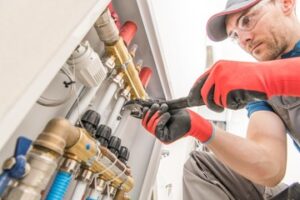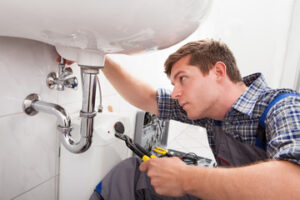Provo Plumber is best known for showing up to fix burst pipes or clogged drains, but this skilled tradesperson does much more. From installing plumbing systems to collaborating with other professionals, there are many benefits to becoming a plumber.

The first step is completing a plumbing apprenticeship program. Apprenticeship programs generally take between three and five years to complete, and pay you while you learn.
Plumbing systems are a vital part of home and business infrastructure, connecting water supply, wastewater removal, and stormwater management. Plumbers install, repair, and maintain these systems to ensure safe and efficient operation. They use specialized tools to inspect, test, and diagnose problems with pipes, fixtures, and appliances such as water heaters and toilets. Plumbers must also have knowledge of building codes and blueprints to properly place and connect systems.
During construction, plumbers work with engineers and architects to design plumbing systems for new buildings. They are responsible for ensuring that the pipe layout and installation meets building requirements to prevent leaks, structural damage, and water waste. Pipes that transport potable water must be insulated and made of corrosion-resistant materials to ensure safe and reliable delivery.
While most of us take our plumbing for granted, we depend on it to keep our homes and businesses running smoothly. When there’s a problem, it can impact our daily routines and cause significant damage to our property. Regular plumbing maintenance and repairs can help reduce the risk of serious problems, saving you money in the long run.
Plumbing issues often arise unexpectedly, making emergency situations stressful and unpredictable. This is why it’s important to choose a qualified, professional plumber for any repairs or installations you need. A quality plumber will be able to assess the situation and provide you with an accurate estimate before beginning any work.
Plumbers must have good communication skills to explain technical concepts in non-technical language and answer questions from customers. They must also be able to work well under pressure and remain calm in high-stress situations. In addition, plumbers should be willing to learn new skills and technology to stay current with the industry.
While many career paths require years of schooling and huge tuition bills, becoming a plumber offers a unique opportunity to begin earning while learning on the job. Most plumbers receive training through an apprenticeship program, allowing them to forgo expensive school loans and start making real money right away. This career also allows you to choose your own hours, allowing you to fit it around other commitments like family, hobbies, and education.
Waste Disposal
The disposal of waste is an important part of the environmental process. This process may involve a number of different techniques. Some of these are regulated by law. For example, chemical waste is regulated and must be handled properly. Other types of waste are also regulated, such as radioactive waste and medical waste. These wastes must be stored and transported in containers that are secure. They should not be buried or burned. In addition, these substances should not be allowed to pollute the environment.
Most people don’t know that there are several ways to dispose of food waste. The most common method is to pour it down the drain. However, this can clog pipes and cause serious problems. A better solution is to use a waste disposal unit. This is a small machine that goes underneath your sink. It grinds the waste into smaller pieces so that it can pass through the pipes without causing any blockages.
Waste disposal also includes reducing, recycling, and replacing toxic substances in the environment. This is a crucial step in the environment’s rehabilitation. However, it is not always easy to achieve. This is especially true for industrial products. Some of the most problematic types of waste are plastics, batteries, and sanitary products. These materials are a major source of pollution and can contaminate water, soil, and air.
In order to reduce the amount of waste, people must make sure that they recycle as much as possible. They should also make sure that they don’t let harmful chemicals leak into the groundwater. It is also important to avoid dumping waste into rivers and canals.
It is not recommended to burn any kind of waste because it can create a lot of toxic fumes. In addition, it can also be dangerous to human beings. It is also not a good idea to dump waste into rivers and canals because it can lead to soil degradation and chemical leaching into subsurface water sources. Some of these contaminants are recirculated in the air, which can harm human bodies. In addition, open burning can produce a lot of smoke and toxic fumes.
Customer Service
Plumbing professionals often interact with customers to assess their needs, provide advice, and estimate costs for plumbing solutions. They also work closely with construction teams and architects to ensure that plumbing systems integrate seamlessly into building projects and meet all relevant regulations and standards.
Soft skills, such as communication and problem-solving, are also important for plumbers to have. They must be able to listen to customers’ concerns and explain complex technical issues in ways that are understandable to non-plumbers. This requires excellent interpersonal skills.
Industrial plumbers often work in factories and other large-scale industrial settings, where they may need to install and maintain specialized equipment like steam boilers and cooling systems. These plumbers require strong knowledge of industrial plumbing systems and a willingness to learn new skills and technologies as needed. They also need to be able to interpret blueprints and other technical documents. They must also be able to obtain and manage permits and inspections for plumbing work.
Work Environment
A plumber’s work environment can vary depending on the type of plumbing work they are doing. For instance, a plumber may work directly with homeowners and apartment residents to repair plumbing issues or install new fixtures and systems. This often requires working in tight spaces and navigating around furniture, appliances and other household items. Plumbers must also be comfortable interacting with customers and explaining complex plumbing problems in layman’s terms. This job also demands attention to detail, as even a minor error in installation or repair can lead to bigger problems down the road. Physical stamina is another important trait for this career, as plumbers frequently lift and transport heavy tools and equipment.
Plumbers may also work in commercial and industrial settings, installing and maintaining plumbing systems for office buildings, restaurants, retail stores, hospitals and other large facilities. These environments require a high level of collaboration with other trade professionals to ensure all aspects of the building’s infrastructure are functioning properly. Plumbers may also need to travel between different sites to complete plumbing services, or work on-call for emergency situations. This can disrupt their regular work schedule and require them to occasionally work evenings or weekends.
As a skilled trade, becoming a plumber is a great choice for people who enjoy working with their hands and providing vital services to the community. The skills gained through an apprenticeship program or at a vocational school can provide the necessary technical knowledge and practical experience to start this rewarding career. People who enjoy problem-solving and have strong interpersonal skills can thrive in this field.
Although the plumbing industry is cyclical and tends to be more busy during certain times of the year, it is considered a stable career option with good opportunities for advancement. Plumbers who are licensed and experienced can command higher salaries than those just entering the profession. Becoming a master plumber offers even more career options, including working as a contractor or owning your own plumbing business. Plumbers can choose to specialize in a particular area of the field, such as green plumbing technology, which focuses on water conservation and efficiency.

